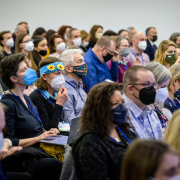Madrid, Reinventing the horizon: science and art in the face of climate change
 Reinventing the horizon, that’s the title of the international symposium organised in Madrid, April 18-19 by the Fundacion Ramon Areces .
Reinventing the horizon, that’s the title of the international symposium organised in Madrid, April 18-19 by the Fundacion Ramon Areces .
A symposium to connect together science and art in a new interpretation of climate change. In the scenario of environmental destruction and uncertainty, it is essential to reinvent a horizon of hope. Humanity is now entering a new unwanted geological period – the Anthropocene – which is characterized by the fact that human beings are changing the vital cycle of the planet, altering its natural variability. Our species has become a force capable of changing some ecological processes, in an escalation of the primacy of cultural evolution over biological evolution.
Reinventing the horizon supposes co-evolving with nature and cooperating in terms of equity with the rest of the human species. But also recognizing ourselves as beings who dream, who imagine a sustainable future, capable of devising and carrying out the great revolution of change towards sustainability. We need ways of life in which the future is seen as a space of good living for all human species and respect for the rest of the world both living and no living. We need a hope that is not simply empty optimism but a commitment to the enormous creative capacity of the human being. A capacity that, as President Kennedy once said, is able to face every challenge.
The responsibility of scientists and artists is to generate new models of life in line with the Sustainable Development Goals promulgated by the United Nations. Thera are numerous and simultaneous drivers of global change: global warming, transformations in land uses, overexploitation of resources …, which has brought with it the destruction of ecosystems and the loss of biodiversity.
It becomes fundamental to seek solutions and creative proposals that allow us to glimpse new ways of organizing personal and collective life, respectful of the ecological integrity, the well-being of humanity as a whole and the dignity of every human being as unique and unrepeatable.
Among these problems, we have focused on human-induced climate change by its status as an epitome that synthesizes and expresses the irreversibility of some of these environmental phenomena of anthropocentric origin. We have already started non-return processes, such as global warming, the melting of the Arctic, the rise in sea level … Processes that demand decisive action by the governments of the world to tackle the causes that generate them, mitigating its consequences and creating mechanisms of adaptation to the new historical circumstances that, in the present and in the immediate future, humanity must face.
What kind of knowledge is needed to face the enormous challenges we face? How to interpret the complex reality of a challenge that is new in the history of humanity? What role does Science play? And the Art, what clues can it give us?
With this philosophy, the Symposium wants to create a transdisciplinary space in which scientific analysis and artistic considerations converge will be able to articulate information, dialogue, imagination and creativity that are needed for the change, from the confidence in the innovative capacity of the human being. According to the words of the frontrunners, the future is on the way. Our responsibility is enormous. We are the first generation that is aware of this problem and perhaps the last one with capacity and time to solve it.
Mario Salomone, Secretary General of the WEEC Network, speaks on Thursday, 19. the title of his speech is Imagination and creativity in the Anthropocene: the role of education and art



Leave a Reply
Want to join the discussion?Feel free to contribute!